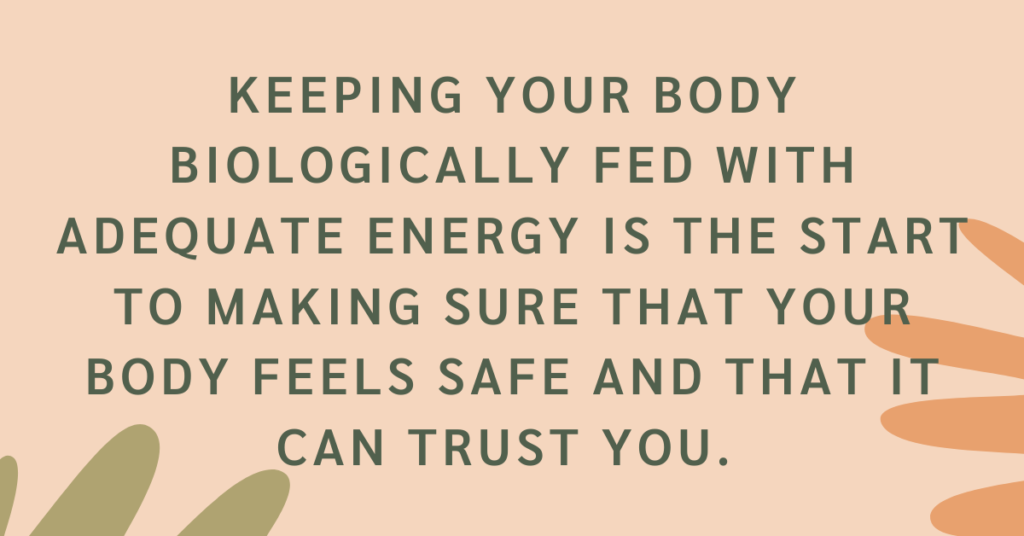Hunger Is Your Friend, Not Your Enemy
December 16, 2021
The eating disorder likes to convince you that hunger is your ultimate enemy. On the eating disorder spectrum, whether it’s restrictive tendencies, or urges to overeat, hunger tends to be an everyday battle.
If your body is asking for food around bedtime, do you push through and deny having a snack because it would break a food rule of eating after a certain time?
In the morning, do you rely on coffee to suppress your appetite and skip breakfast?
The more you attempt to ignore or suppress your hunger, feelings of shame and frustration often surface. Maybe you’ve even had the thought, I wish I never had to feel hunger again; I don’t like dealing with it; eating is too hard…
When you’re suffering from an eating disorder, you’re either distracting yourself from the pain that comes with not allowing yourself to eat or you’re feeling guilty that you didn’t have enough willpower if you “give in.”
Other times, the hunger may be so strong that you end up overeating or bingeing as a result. Then, you’re even more upset that you can’t just be a “normal” eater. This only perpetuates the belief that hunger is the enemy.
The battle between you and hunger can feel very discouraging, but we’re here to tell you that hunger is NOT something to be afraid of or to feel bad about. Hunger IS your friend.
When healing your relationship with food, it’s helpful to reframe the way you think about hunger. Here are some pieces of advice, tips, and ways to start the reframing process.
Reframe the Way You Think About Hunger
Understand the Science
When you strip away the feelings and emotions you have surrounding hunger, you can appreciate the science and physiology behind this basic biological need that we all share.
Ghrelin is the “hunger hormone,” which communicates to the brain that your body is running low on fuel and that it’s time to signal your body to eat.
Newborns experience hunger within the first few hours of entering this world, and they immediately cry as a natural instinct to make sure they receive food.
Our “hunger hormone” exists because we were born with the drive to seek out food. Hunger is a survival mechanism that the body is naturally equipped with so that we know when and how much fuel our bodies need.

Hunger Can’t Be “Tricked”
Since hunger is a hormone that acts in the brain and alerts your body that hunger signals need to go off, trying to “outsmart” your hunger will not be an effective strategy.
Filling up on water, fiber, bulky vegetables, or chewing gum will only delay your hunger more. Your brain and your body are smart; they will know that those tricks are not supplying you with the necessary amount of energy.
When your body is not fed with enough fuel, your ghrelin hormone will keep increasing and your brain will continue to keep your attention on food. Tricking your body only continues the struggle that makes hunger and eating feel so difficult.
The best remedy for hunger is to eat. Eating isn’t a sign of weakness or “giving in,” it’s simply the biology of our bodies working as an amazing machine to keep living!
Hunger Is Your Natural Fuel Gauge
If you drove a car that didn’t have a working fuel indicator, you would be stressed not knowing how much gas you have left, right? Just like cars, we need a fuel indicator so that we can gauge our driving mileage before we run out of gas.
Hunger is your body’s natural fuel gauge and its only job is to communicate when you’re running low and you need to fuel up. Instead of seeing your hunger as a burden, simply observe it as a natural body function.
Without judgement, notice your hunger from a place of curiosity to help you understand what your body needs. Letting go of standards and expectations allows you to take a more comfortable and gentle approach towards eating.

Hunger Is Resilient
Hunger generally only gets “out of control” when it’s ignored for too long, or when there’s a refusal to feed yourself at regular intervals. When you’re used to chaotic eating experiences, or you don’t consistently respond to your hunger cues, understanding your own hunger can get a little wonky and confusing.
This doesn’t mean that your body is broken, or that your metabolism is “damaged,” but it does mean that you might need some help to get back in touch with your hunger cues.
The good news is that hunger is resilient and you can relearn how to better recognize and respond to your hunger cues. Your body never gives up on you, and with healing and practice, you can get back to a place where eating feels effortless.
Reject the Diet Mentality and Honor Your Hunger
Sometimes, hunger is mismanaged in early childhood years due to willful and intentional dieting. If you’ve come from a history of restriction and dieting you will normally struggle with hunger as an adult.
Healing the body by rejecting the diet mentality and making a promise to never force hunger again is crucial to working through the fear of hunger.
Intuitive Eating is all about saying goodbye to ingrained beliefs about dieting and its false hopes, as diets are biologically and psychologically set up to fail, and will never work.
Keeping your body biologically fed with adequate energy is the start to making sure that your body feels safe and that it can trust you. When your body truly believes it will receive food when it sends you hunger signals, chaotic eating greatly diminishes.
Keep Practicing Even When It’s Scary
Hunger doesn’t always show up in the form of three meals and snacks. Sometimes hunger is felt more often, and other times less often.
It’s important to give yourself permission to eat every time you feel hungry, even if you’re unsure and doubtful whether you were truly hungry. Practicing this skill of listening and responding to your hunger cues even when it feels risky is not only a major part of the recovery process, but it’s courageous!
The goal is to better understand your very own appetite, and that takes patience, practice, and time.
Although this can feel intimidating and confusing, if you pay close enough attention and keep honoring your hunger, you’ll begin to see general patterns that eventually help you feel confident in connecting with your own body.

Hunger Is Your Friend, Not Your Enemy – Work With Our Dietitians Today!
Embracing your hunger and utilizing it as the tool it’s meant to be is a gift of self-care.
Hunger is your friend, it’s a good sign, and it’s an indication that your body is on your side, working with you!
You don’t have to do it all on your own. If you’re coming out of an eating disorder and need support in the process of recovery, our dietitians are here for you and can assist you with a meal plan that supports the natural emergence of hunger cues. You can break free from the eating disorder and trust your body again. Connect with us – we can’t wait to meet you
Leave a Reply Cancel reply
designed by morgan sinclair designs
privacy policy
//
meet the team
Nutrition counseling
contact
Blog
Monthly Newsletter
Sign up for our
office locations
Phone number
248-686-0340
fax number
248-655-7478
43334 W. 7 Mile Road, Suite 300, Northville, MI 48167
book initial session
8949 Dixie Hwy
Clarkston, MI 48348